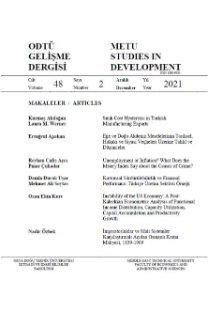Time poverty and the poverty of economics
Zaman yoksulluğu ve iktisatın sefaleti
___
- ANTONOPOULUS, R. and MEMIS, E. (2010), "Time and Poverty from a Developing Country Perspective", Working Paper No 600, Levy Economics Institute of Bard College, New York.
- ELSON, D. (1995), Male Bias in the Development Process, Manchester University Press.
- GOVERNMENT OF ECUADOR (2009), National Plan for Good Living 2009-13: Building a Plurinational and Intercultural State, Ministry of National Planning and Development (Senplades) Quito.
- HIRWAY, I. (2010), "Understanding Poverty: Insights from the Time Use of the Poor", in Antnonopoulus and Hirway, eds. In R. Antonopoulos and I. Hirway, eds. Unpaid Work and the Economy: Gender, Time Use and Poverty in the Global South, UK: Palgrave Macmill.
- ILO (2013), Resolution of the 19th International Conference of labour Statisticians, November 2013, Geneva.
- NSSO (2014), Key Indicators of Employment and Unemployment in India 2011-12, 68th Round, New Delhi.
- OECD (2000), System of National Accounts, 1993 - Glossary, Paris: OECD Publishing.
- SAINATH, P. (2007), "It's been a Hard Day's Night", The Hindu January 24.
- UN (2009), System of National Accounts 2008, New York: United Nations Publications.
- UN SNA (1993), UN System of National Accounts UN.
- VICKERY, C. (1977), "The Time-Poor: A New Look at Poverty", The Journal of Human Resources 12 (1), 27-48.
- ISSN: 1010-9935
- Yayın Aralığı: Yılda 3 Sayı
- Başlangıç: 2018
- Yayıncı: ODTÜ İİBF
Time poverty and the poverty of economics
The effect of the global financial crisis on household income, inequality and poverty in Turkey
Sırma Demir ŞEKER, MELTEM DAYIOĞLU TAYFUR
Hane içine gizlenen kadın yoksulluğu: Muğla-Mardin örneği
Çisel Ekiz GÖKMEN, UMMUHAN GÖKOVALI
Türkiye'de kredi genişlemesinin sektörel dönüşüm üzerine etkisi
Raif CAN, Hüseyin GÜNAY, Mustafa KILINÇ
The world into the 21st century: Globalization, market capitalism and sustainability
Çağdaş tarım sorunu ve yeni köylülük
Dynamic analysis of employment and domestic value added generated by foreign demand in Turkey
Sevinç MIHÇI, Arzu Akkoyunlu WİGLEY, BAŞAK DALGIÇ
Gökhan YILMAZ, DÜRDANE ŞİRİN SARAÇOĞLU
The impact of intangible assets on the productivity of manufacturing firms in Turkey
